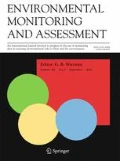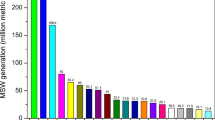Abstract
Environment problems associated with the generation of waste are part of societal changes where households play an important role. These societal changes influence the size, structure and characteristic of given households. For the effective planning of solid-waste handling infrastructure, it is essential to know the quantity of waste generation and its composition. This paper presents the findings of a study carried out in an urban municipal area in Iran to determine the household solid-waste generation rate and waste composition based on field surveys and to determine the related socioeconomic parameters. The dependent variables were waste generation and composition, and independent variables were family size, family employment, age, number of room and education. Over 400 sample households were selected for the study using a stratified random sampling methodology and from five different socioeconomic groups. Waste collected from all groups of households were segregated and weighted. Waste generation rate was 5.4 kg/household/day. Household solid waste comprised of ten categories of wastes and with the largest component (76.9%). The generation and composition of household solid waste were correlated with family size, education level and households income. This paper adequately suggests new insights concerning the role of socioeconomic parameters in affecting the generation of household waste.
Similar content being viewed by others
References
Al-Khatib, I. A., Monou, M., Abu Zahra, A. S. F., Shaheen, H. Q., & Kassinos, D. (2010). Solid waste characterization, quantification and management practices in developing countries. A case study: Nablus district e Palestine. Journal of Environmental Management, 91, 1131–1138.
Badruddin, M., Othman, F., Hashim, N., & Ali, N. C. (2002). The role of socio-economic and cultural factors in municipal solid waste generation: A case study in Taman Perling Johor Bahru. Journal of Technology, 37, 55–64.
Bandara, N. J., Hettiaratchi, J. P., Wirasinghe, S. C., & Pilapiiya, S. (2007). Relation of waste generation and composition to socio-economic factors: A case study. Environmental Monitoring and Assessment, 135, 31–39.
Bruvoll, A. (2001). Factors influent a solid waste generation and management. Journal of Solid Waste Technology and Management, 27, 156–162.
Buenrostro, O., & Bocco, G. (2003). Solid waste management in municipalities. In Mexico: Goals and perspectives. Resources Conservation and Recycling, 39, 251–263.
Burnley, S. J. (2007). A review of municipal solid waste composition in the United Kingdom. Waste Management, 27, 1274–1285.
Congress of the United States (1989). Office of technology Assessment.
Dennison, G. J., Dodd V. A., & Whelan, B. A. (1996). Socioeconomic based survey of household waste characteristics in the city of Dublin Ireland. I. Waste composition. Resources, Conservation and Recycling, 17, 227–244.
Gidarakos, E., Havas, G., & Ntzamilis, P. (2006). Municipal solid waste composition determination supporting the integrated solid waste management system in the island of Crete. Waste management, 26, 668–679.
Gomez, G., Menesesa, M., Ballinas, L., & Castells, F. (2008). Characterization of urban solid waste in Chihuahua, Mexico. Waste Management, 28, 2465–2471.
Marquez, M. Y., Ojeda, S., & Hidalgo, H. (2008). Identification of behavior patterns in household solid-waste generation in Mexicali’s city: Study case. Resources, Conservation and Recycling, 52, 1299–1306.
Nas, S. S., & Bayram, A. (2008). Municipal solid waste characteristics and management in Gümüşhane, Turkey. Waste management, 28, 2435–2442.
Ojeda-Benitez, S., Vega, C. A., & Marquez-Montenegro, M. Y. (2008). Household solid waste characterization by family socioeconomic profile as unit of analysis. Resources, Conservation and Recycling, 52, 992–999.
Philippe, F., & Culot, M. (2009). Household solid-waste generation and characteristics in Cape Haitian city, Republic of Haiti. Resources, Conservation and Recycling, 54, 73–78.
Pokhrel, D., & Viraraghavan, T. (2005). Municipal solid waste management in Nepal: practices and challenges. Waste Management, 25, 555–562.
Qu, X., Li, Z., Xie, X., Sui, Y., Yang, L., & Chen, Y. (2009). Survey of composition and generation rate of household wastes in Beijing, China. Waste Management, 29, 2618–2624.
Saeed, M. O., Hassan, M. N., & Mujeebu, M. A. (2009). Assessment of municipal solid-waste generation and recyclable materials potential in Kuala Lumpur, Malaysia. Waste Management, 29, 2209–2213.
Sujauddin, M., Huda, S. M. S., & Rafiqul Hoque, A. T. M. (2008). Household solid waste characteristics and management in Chittagong, Bangladesh. Waste Management, 28, 1688–1695.
Tchobanoglous, G., Theisen, H., & Vigil, S. (1993). Integrated solid waste management. New York:McGraw-Hill.
Thanh, N. P., Matsui Y., & Fujiwara T. (2010). Household solid-waste generation and characteristic in a Mekong Delta city Vietnam. Journal of Environmental Management, 91, 2307–2321.
Vesilind, P. A., Worrell, W., & Reinhart, D. (2002). Solid Waste Engineering. USA: Books/Cole Thomson Learning, Pacific Grove.
Wang, W., & Wu, Y. (2001). Succession of contemporary city waste policy and necessity of greeting the waste industry. Ecological Economy, 10, 34–37.
Yousuf, T. B., & Rahman, M. (2007). Monitoring quantity and characteristics of municipal solid waste in Dhaka City. Environmental Monitoring Assessment, 135, 3–11.
Author information
Authors and Affiliations
Corresponding author
Rights and permissions
About this article
Cite this article
Monavari, S.M., Omrani, G.A., Karbassi, A. et al. The effects of socioeconomic parameters on household solid-waste generation and composition in developing countries (a case study: Ahvaz, Iran). Environ Monit Assess 184, 1841–1846 (2012). https://doi.org/10.1007/s10661-011-2082-y
Received:
Accepted:
Published:
Issue Date:
DOI: https://doi.org/10.1007/s10661-011-2082-y




